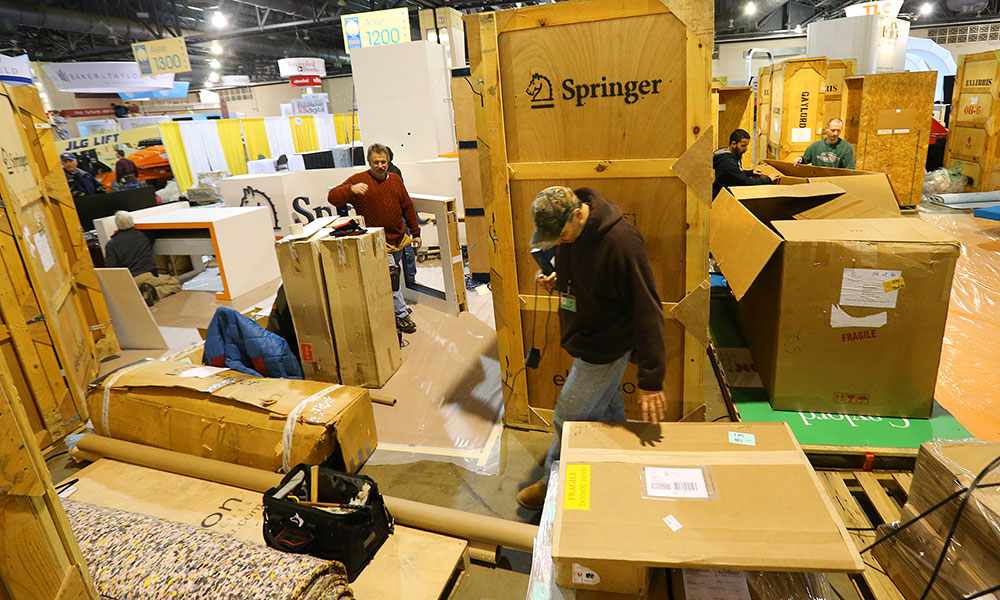
Expos Returning to Philadelphia After Labor Contract Changes
With a new labor agreement allowing the Pennsylvania Convention Center to drop some of its restrictive rules, associations are starting to take their events back to the venue. But two unions left on the sidelines claim venue officials aren't playing fair.
Now that there’s a deal in place with most—but not all—of the labor unions that work the Pennsylvania Convention Center, the Philadelphia facility is starting to win back some business.
The conference venue, which has faced financial issues in recent years, negotiated a deal with four of its six unions to sign a new “customer satisfaction agreement,” which removed some of the most restrictive rules mandating union work—particularly, a requirement that exhibitors can’t use power tools to build and take down their displays. (In the past, that rule proved controversial and resulted in the convention center losing shows.)
The prior agreement, passed in 2002 and extended in 2013, had raised concerns for organizations holding events, many of which had given the convention center low marks. To address the complaints, the Pennsylvania Convention Center Authority (PCCA) hired venue management firm SMG to handle day-to-day operations, and the two groups worked out new deals with workers. Four unions—Laborers Local 332, Riggers Local 405, IATSE Local 8, and Electricians Local 98—signed on to an agreement in May.
The new customer satisfaction agreement is meant to do two things: rein in the high labor costs associated with the venue and drum up new convention business. It appears that, at least regarding the latter, it’s starting to have an effect.
“The efforts made to improve the customer experience and lower customer costs are resulting in a rebirth of the Pennsylvania Convention Center as one of the premier convention center facilities in the nation,” Gregory J. Fox, PCCA board chairman, said in a statement on conference bookings earlier this week.
Ready to Return
Since the new agreement was signed, two associations—the National Black MBA Association (NBMBAA) and the American Industrial Hygiene Association (AIHA)—have committed to bring their events back to the city. Both cited the less-restrictive rules as the catalyst for their return.
“Philadelphia has long been a ‘go-to’ city for so many reasons, but bringing a large meeting to the center was simply too difficult because of onerous work rules and limitations on exhibitors,” AIHA Executive Director Peter J. O’Neil, CAE, said in a statement. “This meant that, despite a successful meeting in 2007, AIHA would not reconsider Philadelphia.”
But with the “better work rules [and] expanded exhibitor rights,” O’Neil said that the association’s conference—expected to draw more than 6,000 visitors to the city—would return in 2018.
NBMBAA backed out of holding its 2014 annual meeting in the city, citing labor concerns. While the association had wanted to return to Philadelphia for years—in part due to its “growing minority business community”—it only became feasible with the new labor contract, said NBMBAA President and CEO Jesse Tyson.
The group has committed to bring its roughly 8,000 attendees to the city in 2017.
They’re claiming this is a lockout. That’s not the case. They voluntarily chose not to become part of the customer satisfaction agreement.
Left on the Sidelines
While the deal made it easier to draw association conference business to Philadelphia, reaching it was not a smooth process.
Two of the convention center’s six unions failed to sign the deal with PCCA before the May 5 deadline. The result was that Carpenters Local 8 and the Teamsters Local 107 have remained on the sidelines and are currently barred from working the venue.
Earlier this week, the shut-out unions led a strike in front of the convention center, protesting what they called a lockout.
But convention center officials reject that view.
“[T]hey had the opportunity to sign onto a contract and they chose not to do it,” PCCA spokesman Pete Peterson told NewsWorks. “They’re claiming this is a lockout. That’s not the case. They voluntarily chose not to become part of the customer satisfaction agreement.”
The carpenters union has taken its grievances to the National Labor Relations Board, alleging unfair labor practices.
Labor conflicts have been a persistent problem for PCCA. Last August, as the annual meeting of the American Association of Diabetes Educators was about begin, four unions went on strike. The conflict ended after about 12 hours, allowing the event to continue.
Workers assemble booths at the Pennsylvania Convention Center for the American Library Association's Midwinter Meeting in January. (via ALA's Flickr page)






Comments